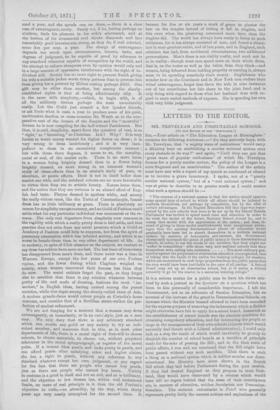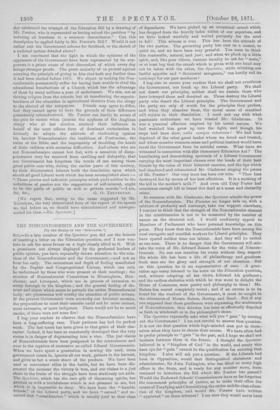LETTERS TO THE EDITOR.
MR. TREVELYAN AND UNSECTARIAN SCHOOLS.
[TO THU EDITOR OF VIII " Sean:m.1 Sfa,—Your article on "The Education League at Birmingham" contains the following sentences ;--44 Do they seriously hope, with Mr. Trevelyan, that a mighty wave of enthusiasm' would carry a Ministry bent on establishing a secular national system over every obstacle in its way ?" and again, " Until they can get that great wave of popular enthusiasm' of which Mr. Trevelyan dreams for a purely secular system, the policy of the League is a mere fragment and an anachronism." The author of the article must have met with a report of my speech so condensed or altered as to involve a grave inaccuracy. I spoke, not of a " purely secular national system," but of a " real national system ;" and was at pains to describe in as precise words as I could muster what such a system should be :— " The essence of a national system is that the nation should approve some special type of school to which all others should be induced to conform themselves, not perhaps by compulsion, but by the offer of certain advantages. In the English Education Bill that type was repre- sented by the now schools that were to be set up by the School Boards. Parliament was invited to spend much time and attention in order to fix what the model of the future National School should be, and to stamp that model with the approbation of the nation ; and then, in- stead of giving to these model establishments such exceptional advan- tages that the existing denominational places of education would gradually have been led to absorb themselves in a uniform national system by motives of honourable self-interest, the Government enormously increased the grant of public money to those denominational schools, in order, to use the words of the minister, that they might not 'suffer in competition' with those very now national schools that they themselves were calling into existence The most ordinary pre- caution against the perpetuation of sectarian education was neglected, that of taking into the hands of the nation the training colleges for masters, which are maintained in such large proportion from the public purse that the stop would have boon justifiable in the eyes of all parties. A School Beard may sot up an unsectarian school, but it is under a virtual necessity to go for the master to a sectarian training college."
It is a serious matter for a public man to have his views mis- read by such a journal as the Spectator on a question which has boon to him personally of considerable importance. I left the Government, not as an advocate of Secular Education, but on account of the increase of the grant to Denominational Schools, an increase which the Minister himself allowed to have been conceded for the express purpose of removing the inducement which a district might otherwise have felt to apply for a school board. Inasmuch as the establishment of school boards was the absolute condition for obtaining compulsory education, and for interesting the people at large in the management of their own schools (objects which would naturally find favour with a Liberal administration), I could only look ou a stop the result of which would inevitably be greatly to diminish the number of school boards as a sacrifice of priuoiple made for the sake of passing the Bill ; and in the then state of public affairs, I was amid am convinced that the Bill might have been passed without any such sacrifice. That there is such a thing as a national system which is neither secular nor deno- minational the Ministry have since shown in the Scotch Bill which they laid before Parliament during the past session. If they had treated England as they propose to treat Scot- land, they would have discovered by a success which would have left uo regret behind that the mass of their countrymen are, in matters of education, neither Secularists nor Denomina- tionalists. The eminent caricaturist in ranch who generally represents pretty fairly the current notions and aspirations of the
day celebrated the triumph of the Education Bill by a drawing of Mr. Forster, who is represented as having solved the problem " by reducing all fractions to a common denominator." Can this description be applied fairly to Mr. Forster's Bill ? Would it not rather suit the Government scheme for Scotland, or the sketch of a national system detailed above?
I am convinced that the light in which the opinions of the opponents of the Government have been represented by its sup- porters is a prime cause of that discomfort of which every day brings stronger proofs. The great majority of us protest against carrying the principle of giving to him that bath any farther than it had been carried before 1870. We object to making the Non- conformists permanently suffer for having been unable to rival the educational benefactions of a Church which has the advantage of them by many millions a year of endowment. We aim, not at driving religion from the schools, but at transferring the superin- tendence of the education in agricultural districts from the clergy
to the elected of the ratepayers. Friends may agree to differ, but they cannot agree to have the grounds of their difference persistently misunderstood. Mr. Forater can hardly be aware of the pain he causes when (amidst the applause of the Anglican clergy who at last election strained their influence in behalf of the most odious form of dominant sectarianism in Ireland) he adopts the attitude of vindicating against his brother Nonconformists the traditions of Puritanism, the value of the Bible, and the impropriety of troubling the beads of little children with sectarian difficulties. And others who are not Nonconformists cannot but feel, with a sensation of disap- pointment ,very far removed from cavilling and disloyalty, that our Government has forgotten the words of one among those great public men who, during the earlier years of this century, by their disinterested labours built the foundation upon which stands all good Liberal work which has been accomplished since :— '"rhose precise and inflexible principles which yield neither to the 'seductions of passion nor the suggestions of self-interest, ought to be the guide of public as well as private morals."—I am, [We regret that, owing to the cause suggested by Mr. Trevelyan, the very abbreviated form of the report of his speech we had before us, we should have misunderstood and misrepre- sented his view.—ED. Spectator.]



































 Previous page
Previous page